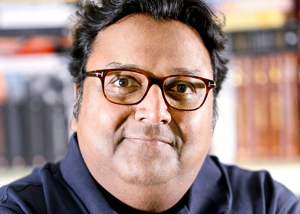Ashwin Sanghi ranks among India’s highest selling English fiction authors. He has written several bestsellers (The Rozabal Line, Chanakya’s Chant, The Krishna Key, The Sialkot Saga, Keepers of the Kalachakra) and two New York Times bestselling crime thrillers with James Patterson, Private India (sold in the US as City on Fire) and Private Delhi (sold in the US as Count to Ten). Included by Forbes India in their Celebrity 100 and winner of the Crossword Popular Choice, Ashwin has also mentors, co-writes and edits titles in the immensely popular13 Steps series.
Welcome to ‘Candid-with-Deeba,’ Ashwin. It's a pleasure to have you as our Guest. I would like to ask you the following questions:
Ashwin : My passion for reading was ignited when my maternal grandfather would bombard me with books that were far ahead of my time. He would insist that after reading every book I must write a letter detailing what I liked and what I didn't. That was the genesis. But the spark happened much later. I was in Srinagar and ended up visiting the tomb of a Muslim pir. The shrine is called Rauzabal or “Tomb of the Prophet”. Local land records acknowledge the existence of the tomb from AD 112 onwards. The sarcophagus at Rauzabal has been placed along the north-south axis according to Muslim custom but the true burial chamber beneath reveals that the grave of YuzAsaflies along the East-West axis as per Jewish custom. A carved imprint near the sarcophagus of Rauzabal shows a pair of normal human feet that bear crucifixion marks on them. I was fascinated with the notion that the man buried in the tomb could possibly be Jesus Christ. This led to my first book, The Rozabal Line.
Ashwin : Self-publishing is an extremely crowded space in which it is almost impossible to be noticed. While most new authors will tend to look at success stories, the reality of the situation is that the average self-published title sells around 100-150 copies, mostly to the author’s friends and family. Virtually none of the mainstream newspapers or magazines wish to read or review a self-published title, so getting visibility is almost impossible. Distribution of your title tends to be limited to online stores because the brick-and-mortar stores rarely stock self-published titles (though Crossword has just started a program that does). It is important to understand that self-publishing takes the pain out of getting yourself “out there”, but once you are, it’s rather difficult to make a living from it. Self-publishing is an easy route to getting your work out into the public domain but it places a greater responsibility on the author as regards content, quality, editing, cover design, pricing and promotion. Treat self-publishing as a serious endeavour to get all the elements right. If you keep your expectations low and your personal commitment high, you might just be one of the few lucky ones to strike gold.
Ashwin : On weekdays, my writing usually happens early morning between five and nine o’clock. Saturday is a day when I catch up with my latest project because I am able to write or research for several hours at a stretch. Sundays are entirely for my family. I usually take around eighteen months to write a book. The first six months are spent on research; the next three months are devoted to building the plot outline; the following six months are used for the actual writing of the story; and the final three months for editing and polishing. I use three editors on every book.
Ashwin : I rarely face writers block. The reason is my organized style of working. I spend several months collating research, then several months developing a plot outline. By the time that I start writing, my job is like that of a child using crayons within a colouring book. With the outlines drawn, how difficult is it to choose which crayon to use?
Ashwin : That’s like asking a parent to choose a favourite child. I cannot answer that question.
Ashwin : Most people have ideas but they have no idea that they have those ideas. I am simply methodical about jotting down all my observations on a daily basis. Over the past decade, I have emailed myself around 12,000 times with various ideas. When I start work on a new book, I simply review my past observations and then decide on a topic that I can live with for the next two years.
Ashwin : Top 5 favourite books:
Ashwin : Family, books, whisky, cigars.
Ashwin : Water, because it can be added to whisky.
Ashwin : One: don’t think about writing... write! Two: don’t quit your day job… it could be a while before royalties can sustain you. Three: don’t think of yourself as a writer but as a storyteller… words become irrelevant if your story is great. Four: become thick-skinned… rejections and criticism are part of the process of evolving as an author. Five: remember that the words are not yours, they come from a higher power. Stay humble even when you’ve made it.
Ashwin : Excellent initiative. I hope that it will inspire many young authors to persevere.
